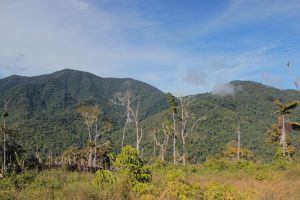Indonesia is bolstering its military presence in disputed Papua province, following the assassination of a senior military officer on April 26.
On Sunday, Indonesian media outlets reported that the Indonesian National Armed Forces (TNI) had deployed 400 members of the elite Infantry Battalion 315 to Papua after the completion of a month of special training at the end of April.
Nicknamed pasukan setan, or “Satan’s forces” in Indonesian, the battalion has previously taken part in conflicts in East Timor and Aceh. A video, purported to feature the battalion executing a series of menacing drills on arrival in Papua, also surfaced on social media on May 1.
The deployment follows an April 26 attack in which Papuan separatist rebels ambushed and assassinated Brig. Gen. Gusti Putu Danny Nugraha, the head of Indonesia’s intelligence agency in the eastern province.
The ambush took place as Gusti was on a tour of Puncak Regency, in Papua’s central highlands, following a series of attacks by Papuan separatists in the vicinity last month. Responsibility for the assassination was later claimed by the West Papua National Liberation Army (WPNLA) the military wing of the Free Papua Organization (Organisasi Papua Merdeka, OPM), which spearheads the struggle for Papuan independence.
As Bilveer Singh noted in these pages this week, past history suggests that Gusti’s killing is likely to prompt violent reprisals from the Indonesian security apparatus. President Joko Widodo’s government immediately vowed to avenge the killing, ordering the police and military “to chase and arrest” all rebels involved: “I want to emphasize again that there is no place for armed groups in Papua,” he said.
Amid the latest deployment, internet services in Jayapura, the capital of Indonesia’s Papua province, were cut last Friday, in an apparent repeat of 2019, when the government shut down internet service in Papua region during weeks of protests and deadly unrest between August and September that year. Victoria Koman, an exiled Indonesian rights activist, said yesterday that she had received reports that mobile and internet services in Puncak have also been disrupted.
The buildup follows several years in which tensions have risen in Indonesia’s easternmost province, where locals have been fighting for independence since its absorption by the Indonesian state in the 1960s. Last week’s deployment follows the dispatching of more than 21,000 Indonesian troops to the Papua region over the past three years.
Benny Wenda, interim president of the United Liberation Movement of West Papua (ULMWP), said the situation was shaping up as the “biggest military operation since the late 1970s.” “I issue this urgent warning [to] the world – huge Indonesian military operations, some of the largest in years, are imminent in West Papua,” Wenda said.
In another sign of the increasing tensions in the region, Indonesia’s Coordinating Minister for Security, Politics, and Legal Affairs Mahfud MD responded to the assassination of April 26 by officially branding the WPNLA and other armed Papuan resistance groups “terrorists.” The government, military, and much of the Indonesian media, typically refers to regional separatists in Papua as Kelompok Kriminal Bersenjata (KKB), or “armed criminal group.”
Papua has important political ramifications for the Indonesian government and TNI, which has fought a raft of regional separatist rebellions since the 1950s, and fears that a loss of Papua might prompt other regions to increase their bids for autonomy, or even independence, from Jakarta. But the real reason may be money. As the journalist Duncan Graham noted this week, Papua also happens to contain the world’s sixth-largest gold mine and second-largest copper mine, in addition to a bounty of other natural resources.
In this context, the labeling of Papuan rebels as “terrorists” fulfills the important function of anathematizing their calls for autonomy and justifying the extraction of natural resources from the area. It certainly won’t lead to peace.
Usman Hamid, the executive director of Amnesty International Indonesia told local media on April 29 that the government should focus instead on the estimated 80 people that his organization identified as victims of extrajudicial killings committed by Indonesian security forces in Papua between February 2018 and December 2020.
“The government should focus on investigating these cases and ending the extrajudicial killings and other human rights violations by law enforcement agencies in Papua and West Papua, rather than focus on the terrorist label,” Usman said.
As it stands, a familiar pattern seems likely to persist: the TNI responding to separatist activities with military crackdowns, which further embitter the population against the central authorities and deepen the OPM’s resolve to achieve independence – by whatever means necessary.

































